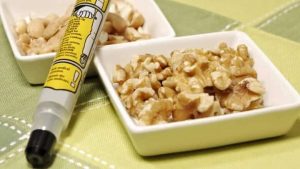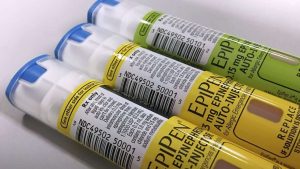School food bans don’t prevent allergic reactions and can stigmatize kids: McMaster-led study

Food bans of peanuts and other items in schools and child-care centres aren’t effective or necessary in preventing allergic reactions, according to a new literature review led by Hamilton’s McMaster University.
P.E.I. woman hospitalized over ‘extremely rare’ COVID-19 vaccine allergy shares her story
The five-year study, published in the Journal of Allergy and Clinical Immunology, led to a list of guidelines from an international panel.
Panel chair Susan Waserman, an allergist and McMaster professor of medicine, said the team couldn’t find good evidence to support food bans.
She said such bans have negatively impacted children.
“They feel stigmatized, they can’t eat with their friends, it has led to bullying, and that’s something that has to be addressed,” she said.
Such bans are often difficult to enforce, “and have not really been proven to work in the literature.”
More training instead of food ban
She said instead of food bans, schools and child-care centres can try other approaches, like training staff to know the signs of a reaction, supervising children, and promoting proper handwashing and cleaning.
“There’s lots of good things happening in schools.”
Waserman acknowledged the international team’s advice may face resistance, but said it’s important to also focus on the other recommendations.
They include:
- Stocking epinephrine autoinjectors (like EpiPen). The drug reverses allergic reactions by opening the airways and regulating blood pressure.
- Having parents create a plan for children with food allergies.

National guidelines on allergies in schools also highlight the need for school plans, staff training, and basic practices including supervising students, identifying ingredients in food and handwashing.
Waserman said the proposed recommendations are conditional, which means the team believes, based on the research, the benefits outweigh the harms.
She also said the team’s review looked at every piece of research on the subject, but the literature itself isn’t of high quality — a sign schools and child-care centres need to record more information about allergic reactions.
“I stand behind the recommendations recognizing they may change … I feel we were extremely responsible.”
Food Allergy Canada supports review
Jennifer Gerdts, executive director of Food Allergy Canada, said while the non-profit organization supports food restrictions in some circumstances, the international team’s recommendations include some good ideas — such as stocking epinephrine and developing individual plans for students.
Some researchers, including one person from Food Allergy Canada, decided not to be listed as co-authors of the study.
Waserman said that’s because the study was especially sensitive to conflicts of interest when voting on recommendations, and some felt that process was “exclusionary.”
She noted no one’s opinions were excluded in the process.
“I chaired this particular guideline and I was asked to refrain from voting on certain question as well.”
Parent supports review, school board cautionary
Kymberly Calder, from Grimsby, Ont., has a 15-year-old son with an allergy to fructose, a simple sugar. She said he’s had many allergic reactions, but she’s “on the fence” about whether there should be school food bans.
“If they have an airborne allergy to a certain food, which means as soon as they can smell it they can go into anaphylactic shock, I do believe they should have a ban,” said Calder. “If somebody has a food allergy that’s just food ingested, I’m not sure they do.”
She supports all the other recommendations from the McMaster-led review, especially stocking epinephrine autoinjectors.
Contacted by CBC News for reaction to the new study, Hamilton’s public school board said in a statement, “We appreciate the literature review,” but it advises families to avoid bringing foods to school if students could get allergic reactions.
“Our focus supports the education related to managing food allergies … staff continue to engage in anaphylaxis training on an annual basis,” said Shawn McKillop, a spokesperson for the Hamilton-Wentworth District School Board.
Waserman said she hopes the recommendations will lead to more discussion and high-quality research.








Redes Sociais - Comentários